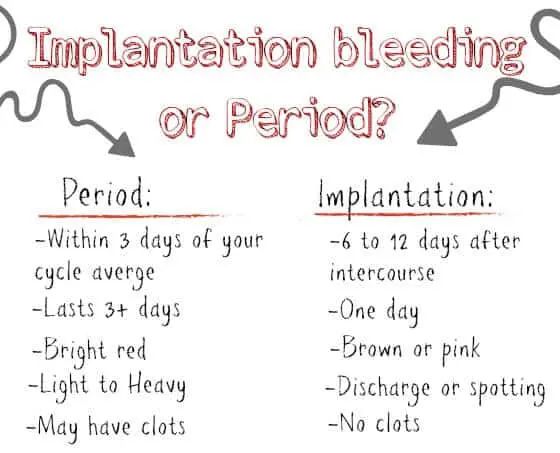Whether you’re trying to become pregnant or hoping you aren’t, when it comes to end-of-cycle spotting or bleeding, you’re likely wondering: how can I tell if it’s implantation bleeding or a period?
What is implantation bleeding?
Implantation bleeding is bleeding that occurs as a result of a fertilized egg implanting in the uterine wall. This bleeding is the first recognizable sign of pregnancy and does not occur in all cases.
What is menstrual bleeding?
While most women already know what a menstrual period is, just for knowledge’s sake, a menstrual cycle is on average 28 days in length but may vary from woman to woman. In this time, an egg should be released (about mid-way through your cycle). If the egg is fertilized, it implants in the uterine wall, and implantation bleeding may occur. Otherwise, the egg travels on and is shed with the uterine lining during your period. If you don’t release an egg, your period may be delayed, but you will likely still experience bleeding. Ovulation, or the release of this egg, can be confirmed by charting your basal body temperature.
Now that we’ve defined both types of bleeding, let’s talk about how you can tell them apart. If you prefer, click the start button below to take our implantation bleeding quiz for a quick answer on the likelihood of your bleeding being implantation. Otherwise, beyond the implantation bleeding quiz start button, you can read about the methodology used in the quiz.
Implantation bleeding or period: How can you tell?
When does implantation bleeding occur?
Implantation bleeding will generally occur 6 to 12 days after intercourse or ovulation so pay attention to when your period should start and when this mysterious vaginal bleeding occurs. If you experience bleeding slightly earlier than you should, this could be a sign of implantation bleeding. If the bleeding is more than 14 days after your last sexual act, it’s unlikely to be implantation.
What does implantation bleeding look like?
Implantation blood is usually a different color than your average menstrual blood being either darker and more brown (old blood) or lighter and pinkish (very new, light bleeding). Keep in mind that the implanting egg is the size of a pinhead. Implantation bleeding is very light and shorter in duration than a normal period with no clots—unless, of course, you don’t normally have one. It’s usually just the faintest pink showing up on toilet paper, blood-tinged discharge, or even just one to two tiny drops of blood. Implantation will not cause heavy bleeding, but there are other ways one can be pregnant and still experience period-like bleeding.
Some women also get a slight hormone dip at implantation, which may cause both a temperature dip on basal body charts and possibly some light spotting. This type of bleeding is not a heavy flow.
How common is implantation bleeding?
Only about one in three women experience implantation bleeding. If you suspect pregnancy or have had unprotected sex, don’t assume that you’re not pregnant simply because you didn’t experience this symptom. Some women become pregnant and exhibit no symptoms whatsoever.
Whether after reading this page or taking our implantation bleeding quiz, you feel you’ve experienced implantation bleeding or not, a home pregnancy test will always be the best way to ease your mind. Be sure to take the test after your regular period should have been and not immediately after the bleeding.
Even if it is implantation bleeding, a pregnancy test will probably still read negative as hCG, also known as the pregnancy hormone, levels will be insufficient. On average, it takes about 48 hours to get even a faint positive test. It’s recommended that you wait to take a pregnancy test until at least four days after your period should have started or roughly 14 days after the sexual act.
Does implantation cause cramps?
Some women do experience implantation cramping, but then, many women also get period cramps and lower back pain. Experiencing cramping alone isn’t an indication that implantation has occurred.
I have pregnancy symptoms. Does that mean it was implantation bleeding?
Unfortunately, many common early pregnancy symptoms, such as breast tenderness, swollen breasts, fatigue, headaches, discharge changes, mood swings, and nausea, are caused in part by the same hormone that peaks just before your period (progesterone) making it just as difficult to tell PMS from pregnancy symptoms as it is to tell implantation from a period.
What else can cause late-cycle spotting or period-like bleeding?
Beyond implantation and a period, there are also other causes of spotting and light vaginal bleeding, such as:
- Bleeding from sex or trauma to the cervix
- Hormonal imbalance or fluctuations
- Infection
- New medication use
- Diet, stress, or sleep changes
If you are trying to decide if its implantation bleeding or a period, you may also enjoy:
How to Calculate Your Chances of Pregnancy (includes quiz)
Period Blood Colors and Textures
Early Signs of Pregnancy Quiz
Period While Pregnant: Is It Possible?
A note on comments: I usually respond to comments within 48 hours. All comments are moderated before they appear on the site to eliminate spam. Each and every comment is responded to as approved, but please remember, I am not a doctor nor a substitute for medical care. I can’t possibly tell you if you are pregnant over the Internet. I do have a medical background (medical assisting) and am a mother of four who struggled with infertility and multiple miscarriages, but I am not a doctor nor claim to be one.

